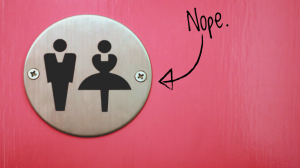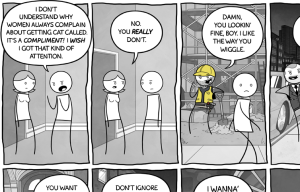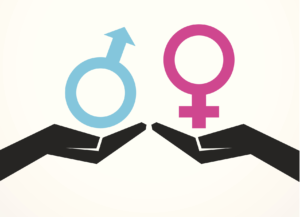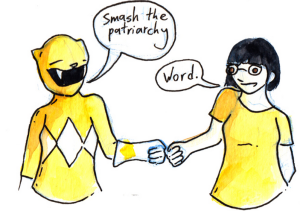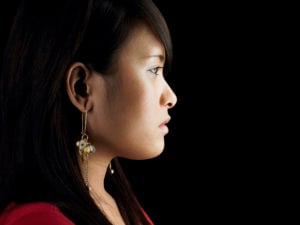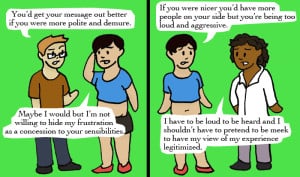Originally published on Let’s Queer Things Up and republished here with their permission.
Coming out as genderqueer and non-binary was this big, beautiful, scary thing for me. I didn’t know what exactly I was moving towards – I only sensed that I was moving in the right direction.
Navigating something as complicated as gender with just my intuition was like running through a corn maze at night. There were a lot of dead ends. There were a lot of bumps and bruises. And it was, at times, totally exhausting.
There’s so much that I wish I had known when I started transitioning that I simply wasn’t able to find. There’s a lot of validation that we all need, but fail to get.
The internet is still tripping about our existence, so there are plenty of articles about what we are and there’s lots of 101. But our lives exist beyond 101. We need something more than that.
There is just so much I wish I had known growing up and that I would tell my younger self now that I’ve learned and experienced so much.
That is why, this week, I wanted to write an article – by a non-binary person, for non-binary people – about the important stuff that we need to know but often don’t.
If you don’t identify as non-binary, you should read this anyway. You’ll learn something, I promise.
So to the non-binary folks out there, here are eight things that I would tell my younger self and that you deserve to be told:
1. You don’t have to be certain and yes, you can change your mind.
People assume because of my confidence or something that I have a very clear idea of what I’m doing.
Haha, that’s funny.
Do I want testosterone? No clue. Do I want top surgery? Uh, maybe? Do I want a more fluid presentation or a decidedly “masculine one”? Ask me again later.
I’m the magic 8 ball of gender. You can ask me the same question ten times and you’ll get at least five different answers.
I don’t know what I want.
For a while, though, I felt like I needed to know exactly what I wanted, and I spent too much time agonizing over it.
I wish I hadn’t. I wish someone had given me permission to be confused, to be unsure, to be afraid.
You don’t have to be sure about your (a)gender, your presentation, or what steps, if any, you’re going to take.
And guess what? You can change your mind! You can change your mind as many times as you’d like, and you are still valid in every single way.
Take your time. Gender is not a race to the finish line; gender is not a competition that you can win or lose. It’s your personal journey, and you can take as much time as you need.
2. You are valid, and you are doing it “right.”
Regardless of what you do, regardless of what choices you make, your identity and your gender (or lack thereof) is 100% valid.
There is no right or wrong way to do gender. And yet there were times when I didn’t feel “trans enough,” times when others questioned my transness, or times when I was excluded because I didn’t fit into this box of what it means to be “trans.”
Others will gender police you, even other trans people, or try to push you back into those boxes – but I want you to know that when they do, they are in the wrong, not you.
You are enough. Always.
3. You deserve respect – so don’t apologize for demanding it.
I spent a lot of time apologizing when I asked people to use my pronouns. And that was a ridiculous thing for me to do in hindsight.
I deserve respect; I shouldn’t be misgendered, I shouldn’t be excluded, I shouldn’t be made to feel unsafe. So asking people to respect me should never have been something I apologized for – and you shouldn’t apologize, either.
People will, at some point or another, make you feel like your identity is some kind of burden on others, or that they’re doing you a favor by treating you like a human being.
But you don’t need to kiss anyone’s ass just because they treated you the way that you should be treated.
And your identity is not a burden – society’s strict adherence to the binary, and failure to recognize and affirm you – is the real burden here.
The constant misgendering, microaggressions, harassment and even violence that we face as non-binary is a burden that far exceeds what anyone who calls YOUR identity a burden will ever experience.
You deserve respect without pandering, without begging, without people asking for cookies or pats on the back. You deserve respect, period.
4. Don’t be afraid to ask for help.
I know firsthand, from being in the community and connected with you all, that NB folks often grapple with depression, anxiety, and other mental health issues.
And because we’re afraid of being misgendered and we’re afraid of having our identities dismantled or interrogated, we’re less likely to seek help.
I didn’t come out as trans to my therapist until much later in our time together, because I was afraid of being forced into an educator role in a situation where I was supposed to be the client.
I silently and needlessly suffered from gender dysphoria, because of that fear.
If you are struggling with your mental health or with dysphoria, which is the distress or discomfort that occurs when the gender someone is assigned does not align with their actual gender, ask for help. Please, please, ask for help.
I know it can be uncomfortable to be put on the spot, and I know misgendering, especially by so-called professionals, can be grueling.
But your mental health is important, and if you need help, it’s important that you get it.
Seek out a therapist. Seek out a healer. Seek out a support group or an online community.
And don’t settle for lousy care – if you aren’t getting what you need, keep looking. You are worth it.
5. Your body is a non-binary body, no matter what it looks like.
When I was trying to get an idea of what I, as non-binary, wanted to look like, I couldn’t help but notice that there was an abundance of thin, traditionally masculine, able-bodied white people without a single curve to be found that were being advertised as androgynous bodies.
There weren’t any bodies that looked like mine.
But here’s the truth: You can be fat and curvy and be androgynous. You can be a person of color and, undoubtedly, be neutrois. You can have boobs and be transmasculine.
What makes a body non-binary is not what it looks like – it’s the person that lives in that body, and identifies that way.
If you feel pressure to pass, to conform, to look a certain way just to feel valid as your gender, I hope you know that your body is a valid non-binary body no matter what shape or form it takes.
6. External validation is great, but self-love is revolutionary.
It’s powerful when we receive validation from others. But I wish someone had reminded me a little earlier on how important self-love is, too.
Over at Everyday Feminism, I wrote a little about the importance of self-love as trans folks.
The gist of it: As we weather microaggressions and dysphoria and oppression, we need to take care of ourselves.
The act of loving ourselves in a society which seldom acknowledges us or affirms us is politically powerful, and psychologically necessary.
While it’s important that those around us respect us, it’s equally important that we put in the work and respect ourselves.
How often are you practicing self-care and self-love? If it’s not often, it might be time to reevaluate your priorities – and put yourself first for a change.
7. You are not alone.
It can feel that way, to be sure. The loneliness is compounded because most folks still cannot see us the way that we see ourselves. It’s complicated to exist outside of what most people have never been asked to imagine.
Yes, being non-binary can be a lonely road.
But it’s worth remembering that you are not the only non-binary person in this world. NB folks have existed everywhere, across cultures and across time. You are not alone in your feelings, experiences, and fears.
If you are feeling isolated, there are so many resources (and more resources, and more), as well as online communities that are waiting for you. And you can come exactly as you are – you don’t need to be out, and you don’t need to be certain.
Sometimes it helps to know that you’re not the only one going through this.
8. Your voice is important, and you deserve a seat at the table.
Your experiences of marginalization, oppression, and fear are important.
And every community that you are a part of – whether you’re a person of color, a person with a disability, working class, atheist – should be including you, and valuing your unique contributions.
We are too often pushed to the margins, both in the trans community but also in other communities that we are a part of.
And I want to remind you that your voice is important to all of those conversations – you should never be excluded from any discussion that you are personally connected to.
As an atheist who is also non-binary, for example, I often wonder why the most vocal and visible atheists at conferences, panels, and events are white, cishet men.
Similarly, when transgender folks are talking about transphobia, are they including non-binary people? Why or why not?
It can sometimes feel like we don’t belong in these communities, despite identifying so strongly with them. But your perspective is important, and you should have a seat at the table in every discussion in which you have something at stake.
If you’re being pushed out, don’t apologize for pushing back. Spaces that do not succeed in including you need to confront their failures – especially those spaces that present themselves as being socially just.
***
There is so much that I wish someone had told me when I first came out.
In the beginning, it felt as if I was completely in the dark – and I withstood abuse, aggression, and loneliness that, in hindsight, I didn’t deserve.
Sometimes I was convinced I was doing something wrong because I was unsure.
Sometimes I let others step on me because I didn’t feel worthy.
Sometimes I settled for disrespect because I thought respect was too much to ask for.
Sometimes I felt like I wasn’t “enough.”
Sometimes I felt alone and I was afraid to ask for help.
Sometimes I hated my body because I thought it wasn’t an “androgynous body.”
Sometimes I thought the validation of others was more important than how I felt about myself.
Sometimes I let others exclude me because I thought I had to wait my turn.
This was my early experience of life as a non-binary person. It was difficult, and scary, and oppressive. And while in some ways things have remained the same, thankfully most things have improved a lot.
I wish someone had stepped in to let me know that I was worthy of respect, worthy of love and support.
I wish someone had told me that there was no right or wrong way to be non-binary, as long as I was being myself.
Most of all, I wish I had realized sooner that I wasn’t alone in everything I was going through.
I hope that my words can offer some comfort and validation, and act as reminders of how deeply worthwhile and important you are. In a society which tries so hard to erase us, it can be easy to forget.
I wish you, and all of my non-binary siblings a safe, healthy, and beautiful journey as you explore your (a)gender. Please know that I am with you every step of the way!
[do_widget id=”text-101″]
Sam Dylan Finch a Contributing Writer for Everyday Feminism. He is queer writer, activist, and educator based in the San Francisco Bay Area. In addition to his work at Everyday Feminism, he is also the founder of Let’s Queer Things Up!, his hella queer and very awesome blog. You can learn more about him here and read his articles here. Follow him on Twitter @samdylanfinch.
Search our 3000+ articles!
Read our articles about:
Our online racial justice training
Used by hundreds of universities, non-profits, and businesses.
Click to learn more


